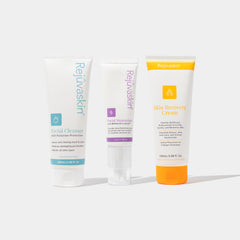There’s a lot of buzz around natural remedies for scars, and one we hear often is the idea that sunlight helps them fade. But is there any truth to it? In this blog, we’re diving into scar prevention and sun protection—answering your top questions: Does sunlight actually help scars? And how long should a scar be protected from the sun? Let’s get into it!
What Are Scars?
Scars are the body’s natural way of healing after the skin has been damaged by an injury, burn, surgery, or acne. When the skin is wounded, your body rushes to repair it by producing collagen—a protein that helps rebuild tissue. But this collagen isn’t always laid down in the same smooth pattern as uninjured skin. In fact, excess collagen can lead to raised, thickened, or discolored scars that stand out from the rest of your skin.
Does Sunlight Help Scars?
Short answer: no—and in fact, it can make them worse. While sunlight may feel good on your skin, the UV rays it brings can darken and worsen the appearance of scars. Fresh scars are especially sensitive to sun damage and can easily become hyperpigmented (darker than the surrounding skin), thickened, or more noticeable.
UV rays break down collagen and elastin in the skin, which are essential for healthy scar remodeling. Sun exposure can delay the healing process and result in long-term discoloration. That’s why protecting your scar from the sun isn’t just a cosmetic concern—it’s a crucial step in effective healing.
How Long Should a Scar Be Protected From the Sun?
Dermatologists recommend shielding new scars from the sun for at least 12 months. During this period, the scar tissue is still actively remodeling and is much more vulnerable to UV damage.
Even after a year, scars located on areas of the body that are regularly exposed to sunlight—like your face, arms, or legs—should still be protected to prevent long-term discoloration and texture changes. Consistent protection can make a significant difference in how your scar looks over time.
Scar Protection Tips: How to Shield Your Skin the Right Way
To give your skin the best chance at healing smoothly, follow these sun protection and scar care tips:
-
Apply sunscreen daily, even on cloudy or overcast days. Choose a broad-spectrum SPF 30 or higher and reapply every two hours if you’re outdoors.
-
Use sunscreen before applying scar creams or gels. Let it fully absorb so the sunblock forms a protective barrier.
-
Cover up with clothing when you’re out in the sun. Hats, long sleeves, and UPF-rated fabrics can help shield sensitive areas.
-
Avoid peak sun hours, typically between 10 a.m. and 4 p.m., when UV rays are strongest.
-
Use a silicone scar gel or sheet in combination with sunscreen. Silicone products help flatten and fade scars while acting as a barrier from irritants, including the sun.
Why Sunscreen Matters for Scar Healing
Sunscreen isn’t just an optional extra—it’s a non-negotiable part of scar care. Using sunscreen:
-
Prevents permanent discoloration
-
Reduces risk of thickened or raised scars
-
Supports smoother skin texture
-
Minimizes long-term visibility of the scar
Combining sunscreen with targeted scar treatments like silicone gels or creams can maximize your skin’s healing ability while minimizing the scar’s appearance.
Rejuvaskin: Your Partner in Scar Healing
At Rejuvaskin, we know how important it is to feel confident in your skin. That’s why we develop gentle, effective products designed to support every step of the healing journey. From medical-grade silicone scar gels to moisturizing skincare essentials, our goal is to help you protect your skin—and the story it tells.
With the right sun protection, quality products, and a little patience, you can give your scars the best chance to heal beautifully.





















Leave a comment